Tue 11 Aug 2020
Archived Pulp Fiction Review: HERBERT RUHM, Editor – The Hard-Boiled Detective: Stories from Black Mask Magazine.
Posted by Steve under Pulp Fiction , Reviews[21] Comments
HERBERT RUHM, Editor – The Hard-Boiled Detective: Stories from Black Mask Magazine, 1920-1951. Vintage, paperback original, 1977.
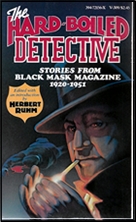
I don’t think that anyone would argue the fact that Black Mask was the best detective pulp magazine around. It died a lingering death after World War II with all the other pulp magazines, but in its pages during the 1920s and early 1930s were some of the toughest detectives in the business — and the freshest writing on the American scene.
The private detective as a two-fisted gallant knight , loyal to his clients and deadly to the undesirable, criminal element of society was a far cry from the sedate British counterpart, and as invented by Carroll John Daly, Dashiell Hammett, Erle Stanley Gardner, and a somewhat later Raymond Chandler, became a much imitated feature of American culture, with copies and variations still alive today.
We’re told that Carroll John Daly’s “The False Burton Combs” (December 1922) marks the first usage of American colloquial speech in Black Mask, the slangy tough vernacular that was to become its trademark. For a time Daly was Black Mask‘s most popular author, though today he’s perhaps remembered only by collectors. The story, about the impersonation of a rich boy in gangster trouble, is a good one. It’s told by the soldier of fortune hired for the job; he’s neither crook nor policeman., but he’s willing to make a quick buck, and equally willing to take his knocks when it comes time.
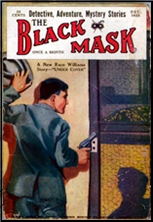
The tough guy narration goes down smooth and natural, but the narrator is still an innocent rube behind his image of worldly sophistication. I suspect Daly later was undone trying to out-tough himself with every story he wrote later on, and forgot the schmaltz that helps pull this one off.
From the very same issue comes “The Road Home” by Dashiell Hammett, under his Peter Collinson pseudonym. It begins as a Stanley-meet-Livingston adventure that in only four pages says more about the inner compulsion of men who spend their lives hunting down criminals than in some novels. Understated and maybe the best story in the book, it’s hard to believe that this is the first time it’s been reprinted.
“The Gutting of Couffignal” (December 1925) has been around many times, and in fact I think it’s the first story by Hammett I ever read. It gets better every time. After the wealthy island of Couffignal is systematically looted by machine-gunning terrorists, the Continental Op, gets to demonstrate both his detective ability and his unswerving loyalty to that choice of career. I was unhappy that in the book’s introduction, Ruhm chose to quote from the final few lines to illustrate the point. You really deserve to get the full impact in context.
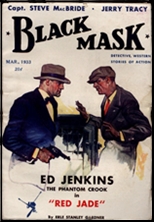
I have a weakness for Hollywood detectives, and “Kansas City Flash” (March 1933) by Norbert Davis takes full advantage of that weakness. When Mike Hull investigates the kidnapping of Doro Faliv, Hollywood’s latest rage in leading ladies, success only reveals yet another sad story midst the twistedly tangled plot. Intended or not, in many ways Doro Faliv is symbolic of the famous 1930s glamor capital of the world. Hiding behind its glittering facade is a brittle sadness and emptiness that all the many love affairs and busy publicity agents were never able to cover up.
Frederick Nebel’s “Take It and Like It” (June 1934) is meant mostly for fun, but in doing so Kennedy and MacBride form the prototype for many 1ater wisecracking detective teams. Kennedy’s a screwy newspaper reporter not averse to a drink or two, while MacBride is his long suffering police captain friend. This time around, however, MacBride has orders to pick Kennedy up for murder, to the glee of the reporter’s enemies on the D.A.’s staff. Nevertheless Nebel has everything under control, and he easily keeps it way this side of flat-out comedy.
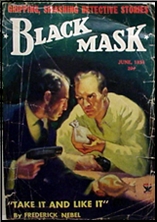
It may be heresy to say so in print, but I’ve never really been a diehard Raymond Chandler enthusiast. “Goldfish” (June 1936) would seem to do well as illustration. The story itself is about a pair of missing pearls, stolen nineteen years before and never recovered by the insurance company. Carmady’s late start on the case doesn’t mean that the fireworks are over – in fact, the treachery and bloodshed have just begun. Chandler’s verbal imagery dazzles, I admit, but more often than not, it’s merely for show and also quite useless to the plot, which has all the connectivity of a plate of hash-browns.
Possibly I’m missing something, as I keep getting the feeling that some key element is hanging just out of my grasp. Chandler and I are fractionally out of sync.
Lester Dent was not really a Black Mask writer, as he wrote only a couple of stories that appeared in the magazine. He spent most of his writing career doing a couple hundred Doc Savage novels. “Angelfish” (December 1936), the story included here, is plagued by Dent’s characteristic semi-literate understatement, but it’s for sure a tough story, told with hurricane ferocity. His hero is a tall, lanky detective named Sail, who dresses all in black. The chase is after some aerial photos of a promising oil field. Uncomplicated, in a breathless way.
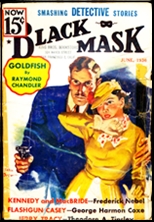
At another extreme is Erle Stanley Gardner, who was so prolific in short pulp work that his bibliography fills a short book in itself, “Leg Man” (February 1938) was a late-appearing pulp story, and it exhibits both Gardner’s unmistakable ponderous dialogue and the elaborate plot machinery that may creak here and there but yet meshes with intricate mastery. Pete Wennick is the leg-man, doing a high-priced law firm’s dirtier investigative work, which may include actively defusing a blackmail scheme. Even though less complicated than usual for Gardner, it still fooled me.
Any anthology taken from the pages of Black Mask needs a Flashgun Casey story by George Harmon Coxe. In “Once Around the Clock” (May 1941) the famed photographer for, the Express requires only a quick twenty-four hours to help an ex-piano player out on parole escape a murder rap. I wouldn’t say Coxe is a bad writer, but the best I could say is that he’s indifferently average.
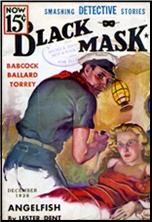
How then has he lasted so long? Take Casey. He’s a down-to-earth guy, with cares and problems of his own, as well as concerns for others. If this makes him a sentimental slob instead of just another hard-boiled character, I’d say that’s why Coxe can keep finding something that readers can keep on enjoying.
Luther McGavock is the only detective I know of who works out of Memphis, Tennessee, and his cases always seem to take him deep into the hill country of the South. In “The Turkey Buzzard Blues” (July 1943), Merle Constiner gives us a deceased aristocratic gentleman of another age, a frowsy political hack, moonshiners, a tired sheriff suffering from the miseries, and a pet buzzard. There’s more than a tinge of comic mayhem throughout, but it’s all too durn much for me, and at 71 pages, far too long.
I’d call William Brandon’s “It’s So Quiet in the Country” (November 1943) Runyonesque if I’d ever read enough Damon Runyon to be sure. A city type mixes it up in rural Vermont with a couple of Poe scholars who find they are in need of his burglarizing services. Kind of funny, but no more.
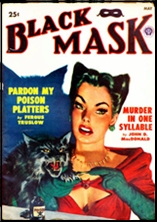
We’re now in the era when straight crime stories were predominant. After a couple of decades perhaps readers and authors both were tiring of the hard-boiled detective. “Killer Come Home” (March 1948), by Curt Hamlin, combines anger with domestic tribulations. Paul W. Fairman tells about a young kid learning about the big time in “Big Time Operator” (July 1948). In “Five O’Clock Menace” (May 1949) Bruno Fischer deals with undercurrents of human nature in a small-town barbershop. All short and all inferior to the crime shocker tales that Manhunt later brought to perfection and rode to success on.
But what results is a true cross-section of Black Mask magazine for the length of its existence. If the quality of the stories begins to slide downward from the beginning of the book to the end, so did the magazine as a whole. I do wonder why something by John D. MacDonald wasn’t used to close the book, as JDM in particular was a strong part of the upturn in quality in the crime story in the 1950s, as the pulps died, and writers turned to paperback novels, and the previously mentioned Manhunt.
One might wish for all the stories from the 1920s, but all but a few that were used have been reprinted for the first time, and the truth is that there’s plenty of stories left for more pulp detective anthologies as good as this one. The best stories, all worthy of “A” ratings, plus or minus, are the pair of Hammett’s, and the ones by Daly, Davis and Dent.
Overall Rating: B plus.
August 11th, 2020 at 6:35 pm
I had something to do with this collection and Jack Irwin had even more influence. We both lived in Trenton NJ and we both ended up with complete sets of BLACK MASK, all 340 issues.
The book is dedicated to Jack Irwin and I’m noted in the acknowledgements. Somehow Herbert Ruhm, a professor, got the job of editing this collection of stories from Black Mask. I say *somehow* because Ruhm did not really know anything about the pulps. He did not collect or have any issues of Black Mask and in fact, during one long conversation with me, admitted to not liking the fiction from the pulps. He wondered why I bothered reading the stuff. This was after a conversation about Henry James who we both liked a lot.
Since he knew nothing about the book that he was to edit, he managed to contact Jack Irwin who had a complete set of the magazine and Jack introduced him to me during one of his visits to Jack’s house.
We both recommended and suggested stories that he should include in the collection and he spent some time reading the stories from Jack’s collection. I remember strongly recommending Merle Constiner who Steve does not particularly care for above, and he agreed to reprint the long “Turkey Buzzard Blues”. I also recommended some other stories as did Jack Irwin.
Herbert Ruhm mentioned to me that originally the book was supposed to be a hardcover but the format was changed later on to paperback original. He evidently corresponded with many writers and also had correspondence from the publisher, etc. A couple years after the book was published he called me and offered to sell all the correspondence to me. I seem to remember the price as being a thousand dollars and I was not interested. When I turned him down he offered the correspondence at a lower price. I wonder what happened to this material.
This is an excellent collection and it’s funny to think that the editor did not really know his subject at all. Maybe he knew Dashiell Hammett and Raymond Chandler but he was definitely a mainstream literary type of guy. Not pulpish at all.
August 11th, 2020 at 8:16 pm
Thanks for telling us the story behind the stories again, Walker. I see I gave the book only a B Plus. I wonder if I read it now whether I might go higher, but take a look at the last three or four authors. There’s not one of them that couldn’t have been replaced by a better known author with what’s even more important, a better story.
August 11th, 2020 at 7:43 pm
I got the impression that length meant that some of the better stories by Chandler, Nebel, and Gardner weren’t chosen and why Ross Macdonald who cracked the later MASK wasn’t involved as well as JDM (and it is possible the cost of acquiring them — if I recall JDM was parceling out his pulp materials in awfully small doses at that time).
You will note how thick the recent more representative pulp anthologies are since so many writers worked at novella length.
We forget even the Saint had a BLACK MASK outing not to mention Michael Shayne and Brett Halliday. Even William Burrough’s published a very minor piece in BM, a Western if memory serves, and Western’s, at least modern ones, weren’t uncommon in the magazine.
This is a fine anthology, but I miss Whitfield, McCoy, Dwight Babcock, and Paul Cain though that wouldn’t be a true cross section I suppose.
“Goldfish” is likely the weakest of the Carmody stories, but probably one of Chandler’s shorter outings too.
August 11th, 2020 at 8:21 pm
“This is a fine anthology, but I miss Whitfield, McCoy, Dwight Babcock, and Paul Cain though that wouldn’t be a true cross section I suppose.”
I suppose that was Ruhm’s objective, but as I pointed out up above, if he wanted to show what the later BLACK MASK was like, there were man many other authors to choose from.
August 11th, 2020 at 7:44 pm
Walker,
Thanks for that story. I’m sure you’ve told it before but I didn’t remember all those details. Was Ruhm a professor at the same college Jack taught at? It is ridiculous that someone who had NO love or even liking for the subject would then edit a book about real pulp fiction. The guy sounds like a real snob.
Steve,
Have you warmed to Chandler since you wrote this review? I know I keep repeating myself, but I put Chandler and Hammett on the top of my list of pulp writers with a slant toward Hammett. The majority of people I talk to who read this stuff prefer Chandler overall ten to one.
August 11th, 2020 at 8:12 pm
Paul, That’s was my much younger self whom you can’t believe I said that. I sort of can’t either, but there are still times when Chandler’s poetic uses of words take me out the story, just to admire them. I think that was what I was trying to say.
As for Hammett vs Chandler, there’s no one better than Hammett … but then again, ask me tomorrow.
August 11th, 2020 at 7:48 pm
Re: comment #2
I’m not sure that Ross Macdonald was published in Mask? Manhunt for sure. Am I remembering correctly?
August 11th, 2020 at 8:09 pm
Paul, You and David are both correct, kind of. One of Ross Macdonald’s stories, “Gone Girl,” appeared in BLACK MASK, but only in the one-shot August 1974 issue. It had appeared earlier in MANHUNT as “The Imaginary Blonde†by John Ross Macdonald, in the February 1953 issue. As far as I know, though, Ross Macdonald never had a story in the original run of BLACK MASK.
August 11th, 2020 at 10:30 pm
Walker, thanks for that story. When I read this book 40 years ago, it never occurred to me that someday I would know one of the guys who helped put it together. This is the least of the three “Hardboiled” anthologies (the others being the ones from Shaw and Goulart, of course), but still quite entertaining. I just got the first volume of Constiner’s Luther McGavock stories from Steeger Books and look forward to reading it. I remember enjoying “The Turkey Buzzard Blues”.
August 11th, 2020 at 10:42 pm
Paul in comment #5 asks if Herbert Ruhm was a professor at the same college as Jack. No, Jack taught math at Trenton State and I recall that Ruhm taught English literature somewhere else. He would have been more at home editing a collection of Henry James stories. At no time did he impress me as having any appreciation of genre fiction.
August 11th, 2020 at 10:59 pm
I wonder if this our Herbert Ruhm:
https://researchworks.oclc.org/archivegrid/record.php?id=759521525
I believe it is.
August 11th, 2020 at 10:54 pm
James, you are right, Jack and I were connected with this book over 40 years ago. It still seems so fresh to me since we both loved Black Mask so much. Though we recommended stories to Ruhm, he had the final decision and decided to use the later stories. He may have thought they were more up to date, etc.
August 11th, 2020 at 11:26 pm
Yes, that’s Herbert Ruhm. I remember he spoke with a European accent and this link shows his connection with Henry James.
I’m glad James mentioned Steeger Books. They own the rights to Black Mask and have published a few issues of the revived new edition plus they have just put out the first 6 volumes in their Black Mask Library. Though I’ve read all the stories I ordered all 6. My favorites are the Robert Reeves, Merle Constiner, and D.L. Champion books.
Matt Moring is the collector behind Altus Press/Steeger Books and is doing a excellent job. He has published hundreds of pulp reprint collections. That’s not a misprint! Hard to believe but Matt has put out hundreds of books.
August 12th, 2020 at 6:50 am
Almost 500 books, Walker! We’ll have to celebrate once that milestone’s reached.
Small world… Walker & I were emailing about this very book a week ago: I had to use it as my source for “Kansas City Flash” for an in-production Norbert Davis Black Mask book. I wondered if this was the first BM anthology, totally forgetting about The Hard-Boiled Omnibus.
Thanks for the kind words on the BM reprints. Lots more coming… sure we’ll do some of the usual suspects like the Continental Op, but I’m more interested in the largely-unreprinted material, like Three-Gun Terry & Jules Tremaine, and complete collections of Oliver Quade, Oscar Sail (including two unpublished short stories), and others. Also, it’s about time to get more of Whitfield’s material into print… we’ll have one coming this fall that’s among his hardest to acquire from Black Mask.
August 12th, 2020 at 9:01 am
I imagine doing books such as the Op stories helps support putting out those with the lesser known characters, and I’m with you all the way with those. Either way, keep them coming!
August 12th, 2020 at 9:21 am
I’ll put in a suggestion for the complete Horace McCoy from BM. Except for a volume of the Jerry Frost stories published in France some years ago, I’m not aware that these (and the non-Frost stories) have ever been gathered together.
August 12th, 2020 at 9:59 am
Fred, good suggestion. I overlooked Jerry Frost in my post: that’s in the works too (it’ll take two books to publish them all).
August 12th, 2020 at 1:18 pm
I’ve always preferred AS TOUGH AS THEY COME (Permabook, 1951) which was assembled by Will Oursler with input from the fabled Cpt. Shaw himself.
August 12th, 2020 at 1:30 pm
Bill Crider reviewed it on his blog back in 2010, including images of the contents page:
https://billcrider.blogspot.com/2010/12/forgotten-books-as-tough-as-they-come_2662.html
Quite a few stories in that I don’t recognize, but some that I do!
August 30th, 2020 at 11:00 pm
I just found Herbert Ruhm’s gravesite on google.com. He was born in Vienna in 1926 and died December 2, 1995, age 69.
I see we have mentioned 3 anthologies of Black Mask above: Ron Goulart’s The Hardboiled Dicks(also includes stories from other detective pulps), Herbert Ruhm’s The Hardboiled Detective, and of course Joseph Shaw’s The Hardboiled Omnibus. But there is a 4th collection: Otto Penzler’s The Black Lizard Big Book of Black Mask.
August 30th, 2020 at 11:25 pm
That one’s about as big as the other three put together! (I’m still working my way through it.)